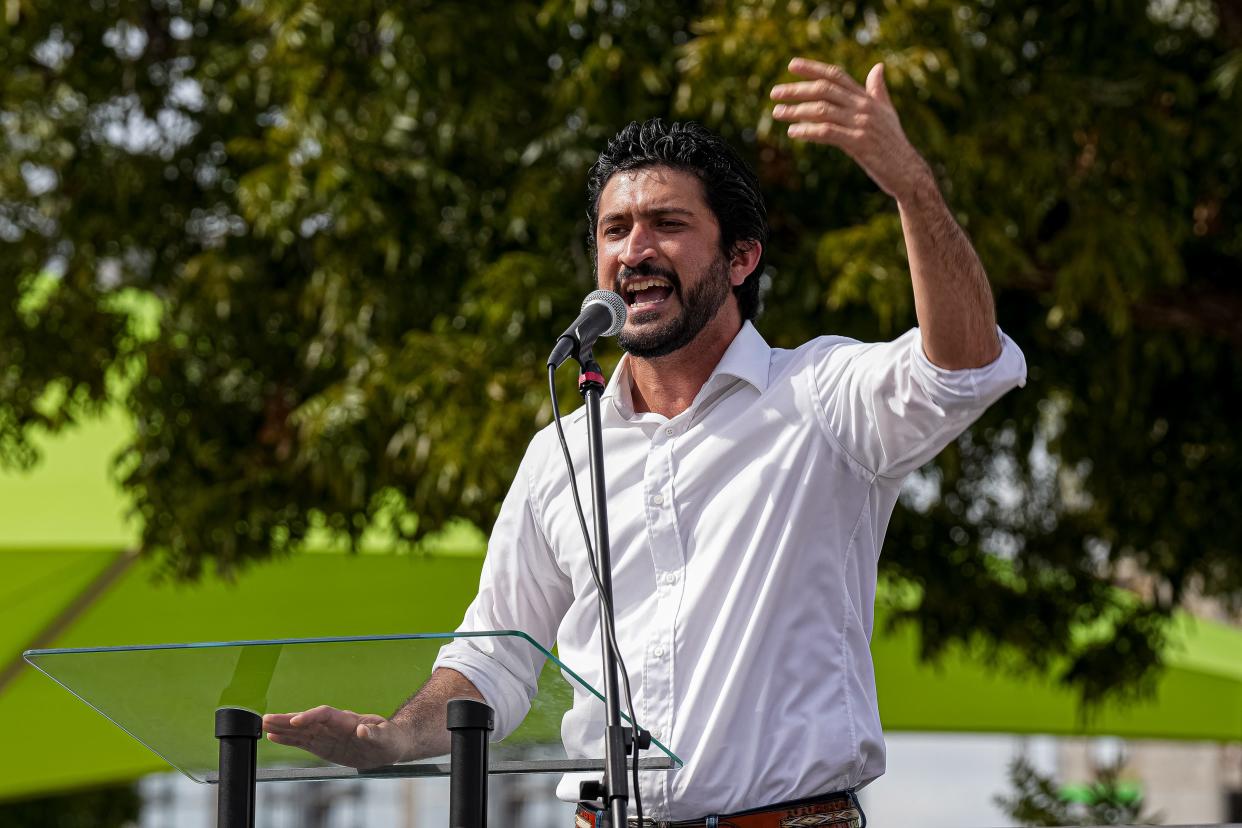Roy, Casar, Doggett land in same column on tax bill vote — for different reasons | Grumet

- Oops!Something went wrong.Please try again later.
- Oops!Something went wrong.Please try again later.
- Oops!Something went wrong.Please try again later.
The tax cut deal that passed the U.S. House of Representatives last week packed a number of surprises.
Not just that the House, coming off of its least productive year in modern history, managed to pass a substantive bill. Or that this massive package sailed out of a bitterly divided House by a whopping 357-70 bipartisan majority.
No, this bill did something I didn’t think was possible: It put conservative firebrand U.S. Rep. Chip Roy in the same voting column as progressive U.S. Reps. Greg Casar and Lloyd Doggett.
All three of these Austin-area representatives voted against the Tax Relief for American Families and Workers Act of 2024 — although, I should emphasize, for very different reasons.
Roy argued the bill provided too much aid to the poorest families.
Casar and Doggett said it didn’t help nearly enough.
The name of the bill notwithstanding, much of the Tax Relief for American Families and Workers Act directs tax breaks to corporations. Roughly $183 billion over the next three years, in fact, coming through more generous tax deduction provisions for things like new equipment and for research and development costs. Great news if you’re Nike (expected to save $195 million retroactively on its 2022 tax bill) or Netflix (poised to qualify for a $220 million tax refund).
The package is less generous to actual families and workers, who would get $33 billion in tax breaks over the next three years.
As Casar put it on the House floor last week: “For every dollar going to kids in the bill, $5 goes to corporations.” Doggett decried the measure as a “corporate tax windfall bill thinly disguised as help for children.”
Tax season: Proposed child tax credit changes might create confusion on 2023 returns
Help some, or insist on helping more?
In fairness, the aid to families is not insignificant. Making lower income parents eligible for a larger tax refund through the child tax credit would help the families of about 16 million children in the U.S. — including the families of nearly 2 million children in Texas.
For example, a single parent of two who earns $22,000 as a child care worker would gain $675 in the first year, according to an analysis by the Center on Budget and Policy Priorities. A married couple — with one parent earning $32,000 as a nursing assistant and the other parent staying home to take care of their three young children — would gain $975 in the first year. Money like that can cover diaper costs for a year.

But this bill could have helped so many more. When an earlier version of the expanded child tax credit expired at the end of 2021, 3.7 million U.S. children slipped back into poverty. The skinnier version of the child tax credit expansion in last week’s House bill would lift about 400,000 of them back above the poverty line.
Which is something. But not nearly enough.
“We have the money to pull kids out of poverty, to ensure that people in this country are housed and fed and educated,” Casar said. “The money is there. In this case, the money was sitting right there in this bill, just in the wrong people's pockets.”
I don’t envy Casar and Doggett for the choice they had to make. If your goal is to ease the burden on the poorest working families, ensuring they have a little more money to cover food and other essentials, do you take a deal that helps at least some of them? Or do you reject a bill that’s top-heavy with corporate tax breaks and insist on a more robust package to help working families — knowing the likelihood of passing anything like that is dismal in this House?
“Compromise is great,” Doggett said at last month’s meeting of the House Ways & Means Committee, “but here it’s the kids that are having to do all of the compromising.”
Roy links tax credit to border crisis
On the other side of the aisle, the calculation was much different for Roy. During last week’s floor debate, he praised the corporate tax provisions as being “critical for job growth, for economic growth and critical for the well-being of our country.”
The deal-killer for him was the larger tax credits for poor people — as some families could receive money even if they pay little or no taxes — as well as the possibility that aid could help migrant families if they have children born in America. Noncitizens can file for the child tax credit if their child was born in the U.S.
“We think that is a problem,” Roy said in the House floor debate last week, suggesting it provides a financial incentive for noncitizens to have babies here.

Roy even linked the child tax credit to the border crisis — as if the people fleeing crushing poverty or cartel violence to seek asylum in America are more likely to make their desperate journeys because of a change in the tax code.
Roy asserted “the border is wide open” and “here, we are not just funding it, we are juicing it. We are actually encouraging it. We are supplementing it. We are saying: ‘Come on over here, have children, and get a tax credit.’”
I hate to break it to Roy, but poverty is already here in Texas, where 1 in 5 children lives below the poverty line. Those children are at greater risk of falling behind academically, struggling emotionally and having difficulty getting their health needs met. Considering Texas ranks 39th in economic-well being for children, according to the Annie E. Casey Foundation, financially stretched families here could use all the help they can get.
The Tax Relief for American Families and Workers Act of 2024 faces uncertain prospects in the Senate, and maybe that’s not so bad. The least among us would be best served by an act that truly focused on tax relief for families and workers.
Grumet is the Statesman’s Metro columnist. Her column, ATX in Context, contains her opinions. Share yours via email at bgrumet@statesman.com or via Twitter at @bgrumet. Find her previous work at statesman.com/news/columns.
More from Grumet: Police tore through the wrong house. Now Austin won't pay for the damage.
This article originally appeared on Austin American-Statesman: Austin-area House Reps. reject 2024 tax bill for different reasons

